A Sustainable Project Management Strategy against Multitasking Situations from the Viewpoints of Cognitive Mechanism and Motivational Belief
Abstract
1. Introduction
2. Theoretical Backgrounds and Hypotheses
2.1. Project Management Strategies in Multitasking
2.2. Goal System Theory
2.3. Packing and Unpacking Effects
2.4. Self-Regulation
3. Research Design
3.1. Participants and Experiment Design
3.2. Dependent and Independent Variables
3.2.1. Task Importance
3.2.2. Self-Regulation
4. Research Results
4.1. Manipulation Check
4.2. Hypotheses Test
5. Conclusions
Author Contributions
Funding
Acknowledgments
Conflicts of Interest
References
- Wilcox, K.; Laran, J.; Stephen, A.T.; Zubcsek, P.P. How being busy can increase motivation and reduce task completion time. J. Personal. Soc. Psychol. 2016, 110, 371. [Google Scholar] [CrossRef]
- Swait, J.; Adamowicz, W. The influence of task complexity on consumer choice: a latent class model of decision strategy switching. J. Consum. Res. 2001, 28, 135–148. [Google Scholar] [CrossRef]
- Liu, P.; Li, Z. Task complexity: A review and conceptualization framework. Int. J. Ind. Ergon. 2012, 42, 553–568. [Google Scholar] [CrossRef]
- Perc, M.; Ozer, M.; Hojnik, J. Social and juristic challenges of artificial intelligence. Palgrave Commun. 2019, 5, 1–7. [Google Scholar] [CrossRef]
- Labuschagne, C.; Brent, A.C. Sustainable project life cycle management: the need to integrate life cycles in the manufacturing sector. Int. J. Proj. Manag. 2005, 23, 159–168. [Google Scholar] [CrossRef]
- Baumgartner, H.; Pieters, R.; Haugtvedt, C.; Herr, P.; Kardes, F. Goal-directed consumer behavior. In Handbook of Consumer Psychology; Psychology Press: New York, NY, USA, 2008; pp. 367–392. [Google Scholar]
- Appelbaum, S.H.; Marchionni, A.; Fernandez, A. The multi-tasking paradox: perceptions, problems and strategies. Manag. Decis. 2008, 46, 1313–1325. [Google Scholar] [CrossRef]
- Oberauer, K.; Kliegl, R. Simultaneous cognitive operations in working memory after dual-task practice. J. Exp. Psychol. Hum. Percept. Perform. 2004, 30, 689. [Google Scholar] [CrossRef]
- Pashler, H. 12 Task Switching and Multitask Performance. Control Cogn. Process. 2000, 277. [Google Scholar]
- Sherman, J.W.; Gawronski, B.; Gonsalkorale, K.; Hugenberg, K.; Allen, T.J.; Groom, C.J. The self-regulation of automatic associations and behavioral impulses. Psychol. Rev. 2008, 115, 314. [Google Scholar] [CrossRef]
- Botvinick, M.; Braver, T. Motivation and cognitive control: from behavior to neural mechanism. Annu. Rev. Psychol. 2015, 66, 83–113. [Google Scholar] [CrossRef]
- Shiffrin, R.M.; Schneider, W. Controlled and automatic human information processing: II. Perceptual learning, automatic attending and a general theory. Psychol. Rev. 1977, 84, 127. [Google Scholar]
- Shenhav, A.; Musslick, S.; Lieder, F.; Kool, W.; Griffiths, T.L.; Cohen, J.D.; Botvinick, M.M. Toward a rational and mechanistic account of mental effort. Annu. Rev. Neurosci. 2017, 40, 99–124. [Google Scholar] [CrossRef] [PubMed]
- Agrawal, N.; Wan, E.W. Regulating risk or risking regulation? Construal levels and depletion effects in the processing of health messages. J. Consum. Res. 2009, 36, 448–462. [Google Scholar] [CrossRef]
- Bayuk, J. Should I plan? Planning effects on perceived effort and motivation in goal pursuit. J. Consum. Behav. 2015, 14, 344–352. [Google Scholar] [CrossRef]
- Gollwitzer, P.M. Implementation intentions: strong effects of simple plans. Am. Psychol. 1999, 54, 493. [Google Scholar] [CrossRef]
- Gollwitzer, P.M.; Sheeran, P. Implementation intentions and goal achievement: A meta-analysis of effects and processes. Adv. Exp. Soc. Psychol. 2006, 38, 69–119. [Google Scholar]
- Sheeran, P.; Webb, T.L.; Gollwitzer, P.M. The interplay between goal intentions and implementation intentions. Personal. Soc. Psychol. Bull. 2005, 31, 87–98. [Google Scholar] [CrossRef]
- Kappes, A.; Oettingen, G. The emergence of goal pursuit: Mental contrasting connects future and reality. J. Exp. Soc. Psychol. 2014, 54, 25–39. [Google Scholar] [CrossRef]
- Dalton, A.N.; Spiller, S.A. Too much of a good thing: The benefits of implementation intentions depend on the number of goals. J. Consum. Res. 2012, 39, 600–614. [Google Scholar] [CrossRef]
- Etkin, J.; Evangelidis, I.; Aaker, J. Pressed for time? Goal conflict shapes how time is perceived, spent, and valued. J. Mark. Res. 2015, 52, 394–406. [Google Scholar] [CrossRef]
- Yang, Y.; Kim, H. The influence of visual versus verbal depiction, the size of assortment, and style of processing on consumers choice overload. Korean J. Consum. Advert. Psychol. 2018, 19, 429–450. [Google Scholar]
- Kool, W.; McGuire, J.T.; Rosen, Z.B.; Botvinick, M.M. Decision making and the avoidance of cognitive demand. J. Exp. Psychol. Gen. 2010, 139, 665. [Google Scholar] [CrossRef]
- Kurzban, R.; Duckworth, A.; Kable, J.W.; Myers, J. An opportunity cost model of subjective effort and task performance. Behav. Brain Sci. 2013, 36, 661–679. [Google Scholar] [CrossRef]
- Kruglanski, A.W.; Shah, J.Y.; Fishbach, A.; Friedman, R. A theory of goal systems. In The Motivated Mind; Routledge: Abingdon-on-Thames, UK, 2018; pp. 215–258. [Google Scholar]
- Bandura, A. Self-Efficacy: The Exercise of Control; Macmillan: London, UK, 1997. [Google Scholar]
- Bandura, A. Self-Efficacy. The Corsini Encyclopedia of Psychology; Macmillan: London, UK, 2010; pp. 1–3. [Google Scholar]
- Höchli, B.; Brügger, A.; Messner, C. How focusing on superordinate goals motivates broad, long-term goal pursuit: a theoretical perspective. Front. Psychol. 2018, 9, 1879. [Google Scholar] [CrossRef]
- Neal, A.; Ballard, T.; Vancouver, J.B. Dynamic self-regulation and multiple-goal pursuit. Annu. Rev. Organ. Psychol. Organ. Behav. 2017, 4, 401–423. [Google Scholar] [CrossRef]
- Kruglanski, A.W.; Chernikova, M.; Rosenzweig, E.; Kopetz, C. On motivational readiness. Psychol. Rev. 2014, 121, 367. [Google Scholar] [CrossRef]
- Presseau, J.; Francis, J.J.; Campbell, N.C.; Sniehotta, F.F. Goal conflict, goal facilitation, and health professionals’ provision of physical activity advice in primary care: An exploratory prospective study. Implement. Sci. 2011, 6, 73. [Google Scholar] [CrossRef]
- Fishbach, A.; Dhar, R. Goals as excuses or guides: The liberating effect of perceived goal progress on choice. J. Consum. Res. 2005, 32, 370–377. [Google Scholar] [CrossRef]
- Kivetz, R.; Simonson, I. Self-control for the righteous: Toward a theory of precommitment to indulgence. J. Consum. Res. 2002, 29, 199–217. [Google Scholar] [CrossRef]
- Kopetz, C.E.; Kruglanski, A.W.; Arens, Z.G.; Etkin, J.; Johnson, H.M. The dynamics of consumer behavior: A goal systemic perspective. J. Consum. Psychol. 2012, 22, 208–223. [Google Scholar] [CrossRef]
- Van Boven, L.; Epley, N. The unpacking effect in evaluative judgments: When the whole is less than the sum of its parts. J. Exp. Soc. Psychol. 2003, 39, 263–269. [Google Scholar] [CrossRef]
- Biswas, D.; Keller, L.R.; Burman, B. Making probability judgments of future product failures: The role of mental unpacking. J. Consum. Psychol. 2012, 22, 237–248. [Google Scholar] [CrossRef]
- Tversky, A.; Koehler, D.J. Support theory: A nonextensional representation of subjective probability. Psychol. Rev. 1994, 101, 547. [Google Scholar] [CrossRef]
- Kruglanski, A.W.; Bélanger, J.J.; Chen, X.; Köpetz, C.; Pierro, A.; Mannetti, L. The energetics of motivated cognition: A force-field analysis. Psychol. Rev. 2012, 119, 1. [Google Scholar] [CrossRef]
- Kruger, J.; Evans, M. If you don’t want to be late, enumerate: Unpacking reduces the planning fallacy. J. Exp. Soc. Psychol. 2004, 40, 586–598. [Google Scholar] [CrossRef]
- Tsai, C.; Zhao, M.; Robitaille, N. How “Time Until the End” Influences Actual Versus Predicted Consumer Experiences: a Resource Allocation Account. Acr North Am. Adv. 2016, 44, 241–245. [Google Scholar]
- Unsworth, K.; Yeo, G.; Beck, J. Multiple goals: A review and derivation of general principles. J. Organ. Behav. 2014, 35, 1064–1078. [Google Scholar] [CrossRef]
- Hofmann, W.; Schmeichel, B.J.; Baddeley, A.D. Executive functions and self-regulation. Trends Cogn. Sci. 2012, 16, 174–180. [Google Scholar] [CrossRef]
- Moskowitz, G.B. The representation and regulation of goals. In Goal-Directed Behavior; Aarts, H., Elliot, A.J., Eds.; Psychology Press: New York, NY, USA; pp. 1–47.
- Won, S.-D.; Song, M.S. The Relationship Between Goal-Focused Self-Regulation and Impaired Control on Alcohol: Mediation Effects of Emotion Regulation and Impulsivity. Korean Jounal Health Psychol. 2017, 22, 969–994. [Google Scholar]
- Delahaij, R.; van Dam, K. Coping style development: The role of learning goal orientation and metacognitive awareness. Personal. Individ. Differ. 2016, 92, 57–62. [Google Scholar] [CrossRef]
- Trafimow, D.; Rice, S. Potential performance theory (PPT): A general theory of task performance applied to morality. Psychol. Rev. 2008, 115, 447. [Google Scholar] [CrossRef]
- Helbing, D.; Brockmann, D.; Chadefaux, T.; Donnay, K.; Blanke, U.; Woolley-Meza, O.; Moussaid, M.; Johansson, A.; Krause, J.; Schutte, S. Saving human lives: What complexity science and information systems can contribute. J. Stat. Phys. 2015, 158, 735–781. [Google Scholar] [CrossRef]
- Park, Y.; Park, D.-H. S/W developer’s IT project participation: Focusing on the moderating role of regulatory focus on the effect of technology recency on participation intention. Knowl. Manag. Res. 2017, 18, 45–63. [Google Scholar]
- Park, D.-H. The Effect of Online Community, Members, and Personal Characteristics on Lurking Behavior: Why do people only consume rather than create contents? J. Internet Comput. Serv. 2014, 15, 73–88. [Google Scholar] [CrossRef][Green Version]
- Kwahk, K.-Y.; Park, D.-H. Leveraging your knowledge to my performance: The impact of transactive memory capability on job performance in a social media environment. Comput. Hum. Behav. 2018, 80, 314–330. [Google Scholar] [CrossRef]
- Park, D.-H. Virtuality as a Psychological Distance and Temporal Distance: Focusing on the Effect of Product Information Type on Product Attitude. Knowl. Manag. Res. 2017, 18, 163–178. [Google Scholar]
- Lee, S.; Park, D.-H. Community Attachment Formation and Its Influence on Sustainable Participation in a Digitalized Community: Focusing on Content and Social Capital of an Online Community. Sustainability 2019, 11, 2935. [Google Scholar] [CrossRef]
- Park, D.-H. Virtuality Changes Consumer Preference: The Effect of Transaction Virtuality as Psychological Distance on Consumer Purchase Behavior. Sustainability 2019, 11, 6618. [Google Scholar] [CrossRef]
- Kwahk, K.-Y.; Park, D.-H. The effects of network sharing on knowledge-sharing activities and job performance in enterprise social media environments. Comput. Hum. Behav. 2016, 55, 826–839. [Google Scholar] [CrossRef]
- Park, D.-H. Virtuality as a Psychological Distance: The Strategy for Advertisement Message Appeal Depending on Virtuality. J. Inf. Technol. Appl. Manag. 2017, 24, 39–54. [Google Scholar]
- Park, D.-H.; Kim, S. The effects of consumer knowledge on message processing of electronic word-of-mouth via online consumer reviews. Electron. Commer. Res. Appl. 2008, 7, 399–410. [Google Scholar] [CrossRef]
- Park, D.-H.; Lee, J. eWOM overload and its effect on consumer behavioral intention depending on consumer involvement. Electron. Commer. Res. Appl. 2008, 7, 386–398. [Google Scholar] [CrossRef]
- Park, D.-H.; Lee, J.; Han, I. The effect of on-line consumer reviews on consumer purchasing intention: The moderating role of involvement. Int. J. Electron. Commer. 2007, 11, 125–148. [Google Scholar] [CrossRef]
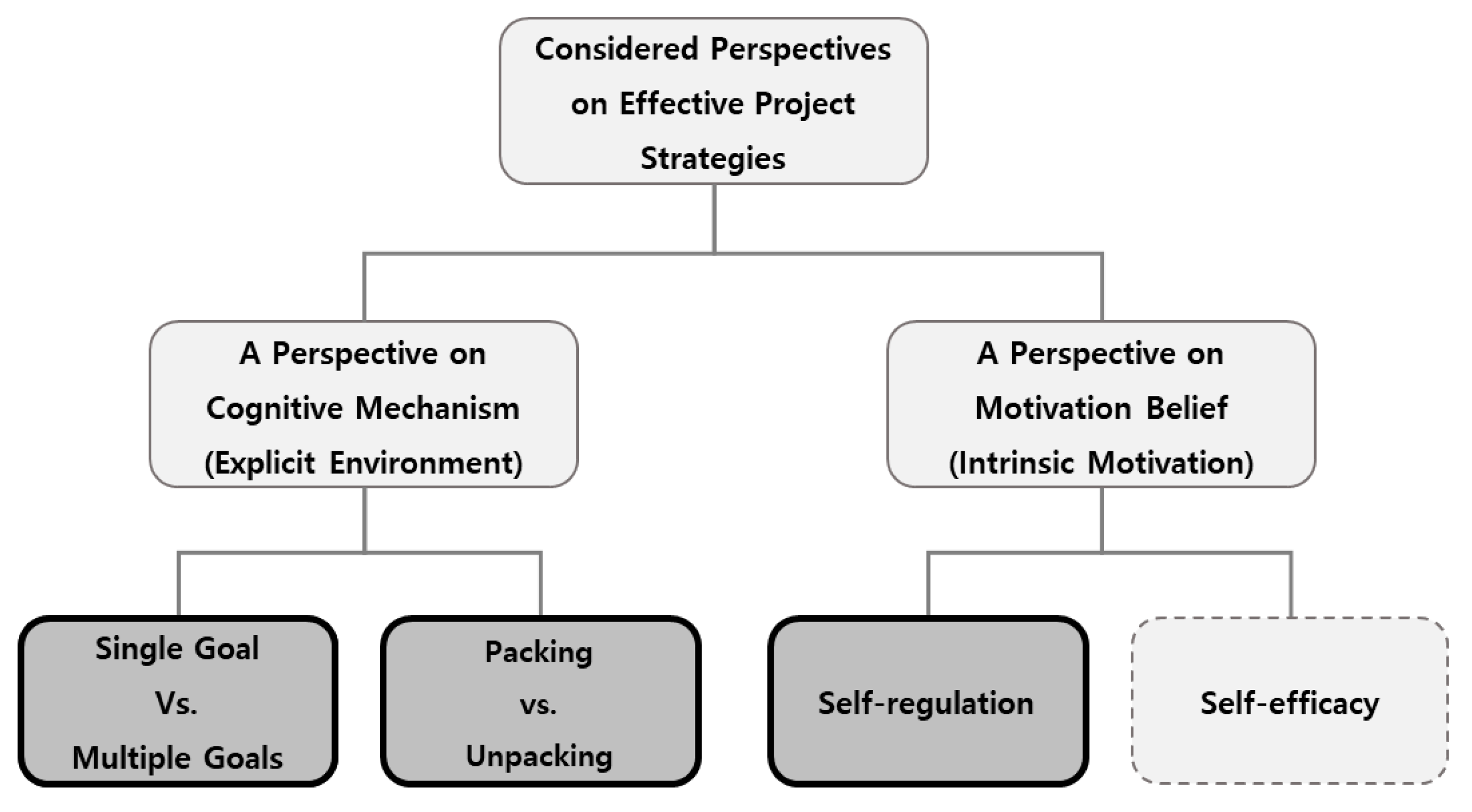

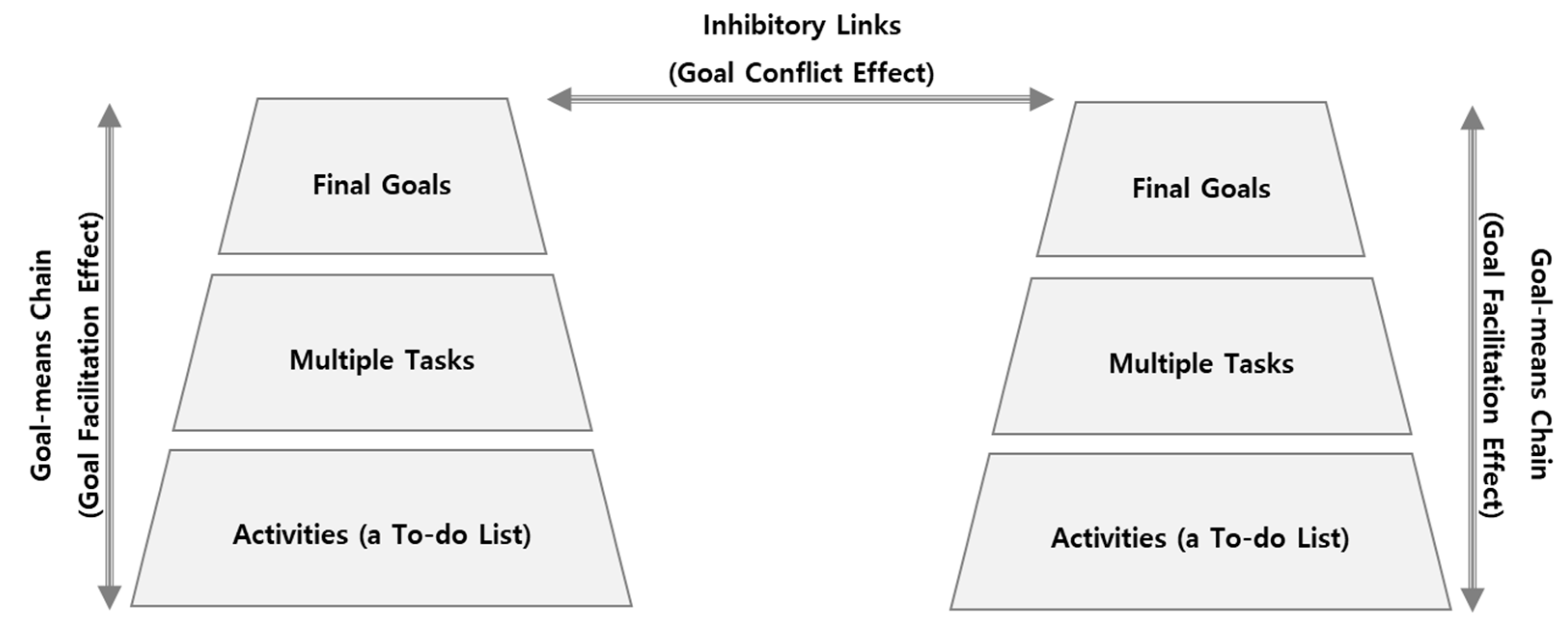
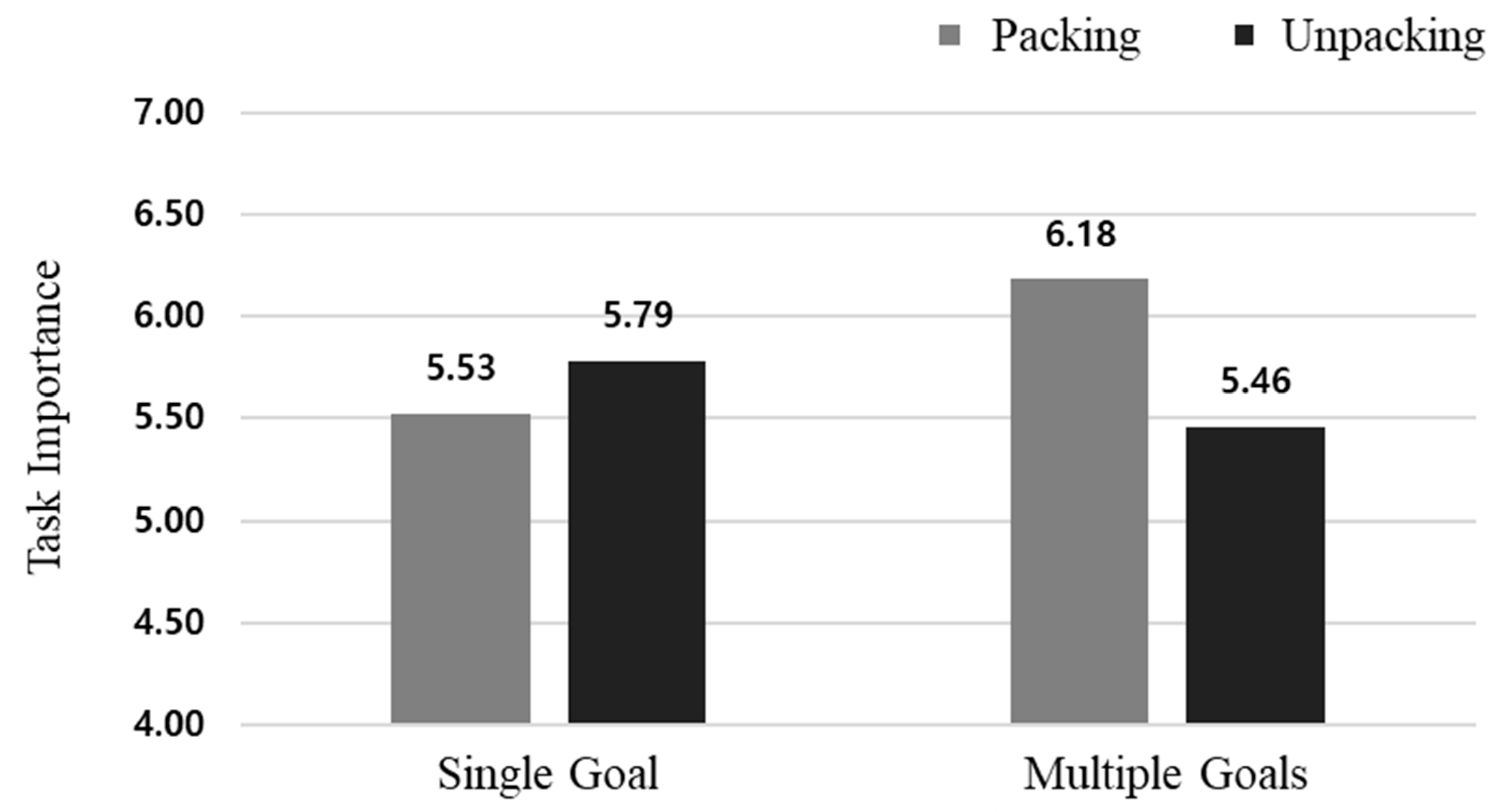
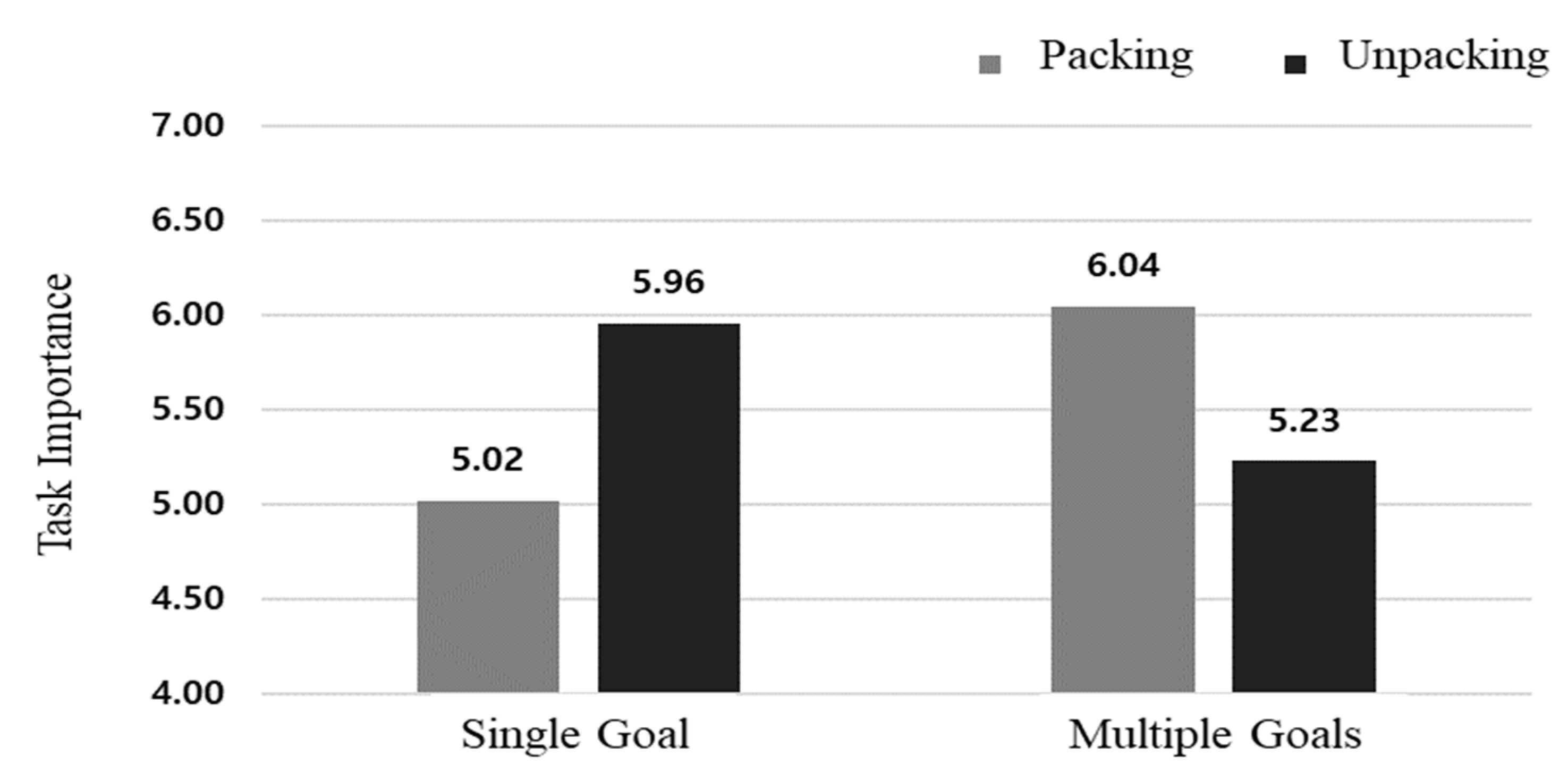
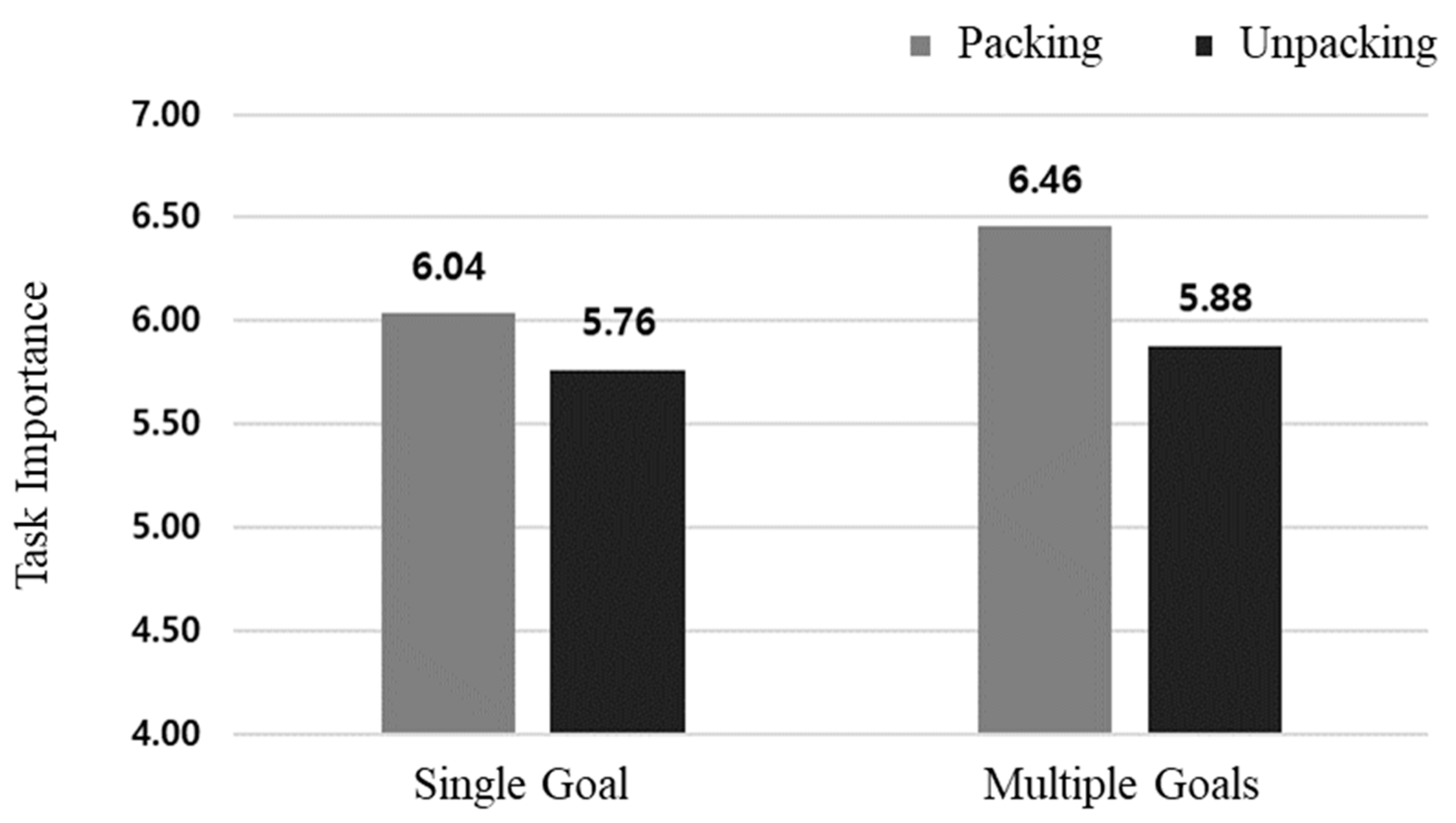
| Source | d.f. | MS | F | Sig. |
|---|---|---|---|---|
| Model | 3 | 4.541 | 6.890 | 0.001 |
| Single/Multiple goals (A) | 1 | 1.224 | 1.857 | 0.175 |
| Packing/Unpacking (B) | 1 | 2.364 | 3.586 | 0.060 |
| A*B | 1 | 10.621 | 16.113 | 0.001 |
| Error | 176 | 0.659 |
| Source | d.f. | MS | F | Sig. |
|---|---|---|---|---|
| Model | 7 | 3.899 | 6.513 | 0.001 |
| Single/Multiple Goals (A) | 1 | 1.489 | 2.481 | 0.118 |
| Packing/Unpacking (B) | 1 | 1.129 | 1.881 | 0.173 |
| Self-Regulation (C) | 1 | 7.653 | 12.753 | 0.001 |
| A*B | 1 | 9.009 | 15.013 | 0.001 |
| A*C | 1 | 1.994 | 3.323 | 0.071 |
| B*C | 1 | 0.124 | 0.206 | 0.650 |
| A*B*C | 1 | 4.476 | 7.459 | 0.007 |
| Error | 130 | 0.600 |
| Source | d.f. | MS | F | Sig. |
|---|---|---|---|---|
| Model | 3 | 4.456 | 6.110 | 0.001 |
| Single/Multiple goals (A) | 1 | 0.378 | 0.518 | 0.474 |
| Packing/Unpacking (B) | 1 | 0.061 | 0.084 | 0.773 |
| A*B | 1 | 13.131 | 18.006 | 0.001 |
| Error | 66 | 0.729 |
| Source | d.f. | MS | F | Sig. |
|---|---|---|---|---|
| Model | 3 | 1.501 | 3.215 | 0.029 |
| Single/multiple goals (A) | 1 | 1.232 | 2.639 | 0.109 |
| Packing/unpacking (B) | 1 | 3.053 | 6.539 | 0.013 |
| A*B | 1 | 0.391 | 0.838 | 0.363 |
| Error | 64 | 0.467 |
© 2019 by the authors. Licensee MDPI, Basel, Switzerland. This article is an open access article distributed under the terms and conditions of the Creative Commons Attribution (CC BY) license (http://creativecommons.org/licenses/by/4.0/).
Share and Cite
Park, J.; Park, D.-H. A Sustainable Project Management Strategy against Multitasking Situations from the Viewpoints of Cognitive Mechanism and Motivational Belief. Sustainability 2019, 11, 6912. https://doi.org/10.3390/su11246912
Park J, Park D-H. A Sustainable Project Management Strategy against Multitasking Situations from the Viewpoints of Cognitive Mechanism and Motivational Belief. Sustainability. 2019; 11(24):6912. https://doi.org/10.3390/su11246912
Chicago/Turabian StylePark, Junyoung, and Do-Hyung Park. 2019. "A Sustainable Project Management Strategy against Multitasking Situations from the Viewpoints of Cognitive Mechanism and Motivational Belief" Sustainability 11, no. 24: 6912. https://doi.org/10.3390/su11246912
APA StylePark, J., & Park, D.-H. (2019). A Sustainable Project Management Strategy against Multitasking Situations from the Viewpoints of Cognitive Mechanism and Motivational Belief. Sustainability, 11(24), 6912. https://doi.org/10.3390/su11246912





